| |
"Ship of Fools, based on the Katherine Anne Porter novel about a boatload of vaguely doomed passengers in the 1930s, is pretty much a disaster. It seems one of the laziest films ever made. I don't know what Kramer did on this film. The screen is almost always filled up with one or two of his stars' faces... This was perhaps Kramer's first and last attempt to make an 'art film' and it failed miserably." |
| |
David Walsh, World Socialist Website* |
| |
"Director-producer Stanley Kramer and scenarist Abby Mann have distilled the essence of Katherine Anne Porter's bulky novel in a film that appeals to the intellect and the emotions." |
| |
Variety, original review New Year’s Eve 1964** |
Uh... OK. If not actually on my knees, I beg to differ with the first quote. Ship of Fools, in many ways, defies mainstream Hollywood which is a plus right there. It was made in 1965 and it concerns a group of people who, with perhaps one nasty exception, have no idea of the future into which they are sailing. The film is set in 1933 and Nazism is on the rise. We start the journey at Veracruz in Mexico and via a stop at Cuba, we finally reach our German destination, the harbour at Bremerhaven. But the film, with an albeit accidental, but nonetheless deft, post-modern reading also offers itself up unknowingly as a parallel narrative sailing into the end of Hollywood as it was. I saw the term 'post-modern' shortened to the Teletubbyesque 'po-mo' in a rather excellent little book called Post Truth, which I heartily recommend. I wonder if any producer or director had any inkling of the cultural tsunami about to break on the shores of Los Angeles in the late 60s? OK, equating Nazism to Easy Rider wasn't exactly my intention but change was in the hair and also the Herr. Choose your own dumb pun (hippy or Nazi). An hour or so into the commentary, listened to after this observation was written down, this point is made which both annoys and satisfies me. Every day, it gets harder to wrap my head around the Brexit/Trump world and how easy so-called civilisation can be compromised by powerful idiots and tiny majorities convinced by lies with some people terrified by the prospect of immigrants bringing on society's collapse. I didn't take the interviewed Northerner's argument. Made on camera after the referendum (with the emphasis on the last syllable) that if "...we were too full, the British Isles would sink." (!) But I did process the vacuity of intelligence that produced the exhaled relief from one female that our passports would no longer be burgundy and go back to being blue. Phew. While a face palm is inadequate, Facebook seems to have invaded our political process like a cancer. Though published before 2016, please read Andrew Davies' shocking exposé of today's journalism in Flat Earth News. I'm re-reading it and it feels like his woeful stories are paving the runway for Brexit/Trump to land. With a resounding thump.
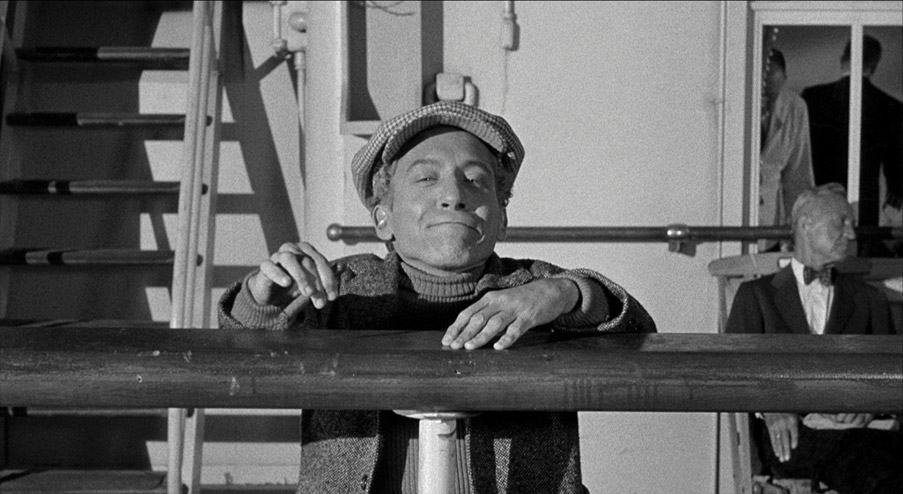
With Ship of Fools, there is no story as such and no single characters thrust forward as the star though each have their moments. All of them go on a literal journey and the fourth wall is well and truly dispensed with, as the first surprise of the film. The dwarf character Carl Glocken played brilliantly by Michael Dunn, walks to the railing and looking into camera seems surprised. I was honestly waiting for the reverse point of view shot so I could see what surprised him. He then starts talking to the audience, fourth wall well and truly broken. Without question, Glocken is one of very few truly sympathetic characters on board and if nothing else Ship of Fools reminds us that the swathes of decency and cruelty in human beings run deep and course relentlessly. Kramer is bidding goodbye to post WWI stability and through his cast remind a 60s audience that democracies are fragile things (some have said this was done a little heavy handedly and while I'm not affected by that reading I can see where it comes from). We should be constantly retold how fragile our societies actually are. I think to be reminded of that, however heavy-handedly, is a plus that cannot be dented. I keep landing on the Joker's quote... the words that show how easily a civilisation can be brought to its knees... "Look at what I did to this city with a few drums of gas and a couple of bullets."
To appreciate Ship of Fools is to appreciate the characters of the fools themselves and to Kramer's credit, his cast is star studded and each gives a superlative performance. I've mentioned Michael Dunn as Carl. Not only is he the first to speak in the film, he's the first indicator that something is afoot on this ship as he is banished from the Captain's table or any table of note to sit with the Jewish passenger, himself ostracised for his religion. It is a German ship after all. Heinz Rühmann (credited as 'Heinz Ruehmann') plays the Jewish jeweller, Julius, with a benevolent twinkle in his eye. He's considerate and kind and strikes up a friendship with Carl over the outsider's table. Rühmann was extremely famous in Germany and this is his only English language film. Kramer's casting him is akin to Spielberg casting François Truffaut in Close Encounters, both Americans aware of cinema outside their own country, who'd have thought it? Rühmann is bunked in with the very opposite of his character, the Nazi-esque José Ferrer as Siegfried. It's an obvious pairing (heavy-handed, perhaps) but Rieber's theatrically sharp edges may not be dulled by the smaller man's wisdom but they may not be as quick to strike. By all accounts Ferrer was uncomfortable in the role. The Holocaust was only twenty years in the past. I still have strong feelings about what happened in 1998, don't you? These two characters have the best and best known exchange in the film and I reproduce it here not as a spoiler but as a taster for the main course...
| Siegfried: |
Lowenthal, you know it is a historical fact that the Jews are the basis of our misfortunes. |
| Heinz: |
Of course. |
| Siegfried: |
You agree? |
| Heinz: |
Of course. The Jews and the bicycle riders. |
| Siegfried: |
The bicycle riders? Why the bicycle riders? |
| Heinz: |
Why the Jews? |
Point made. However that wisdom is thrown into violently razor sharp relief with his other observation that "There are nearly a million Jews in Germany. What are they going to do? Kill all of us?" Lines don't get more chilling than that.
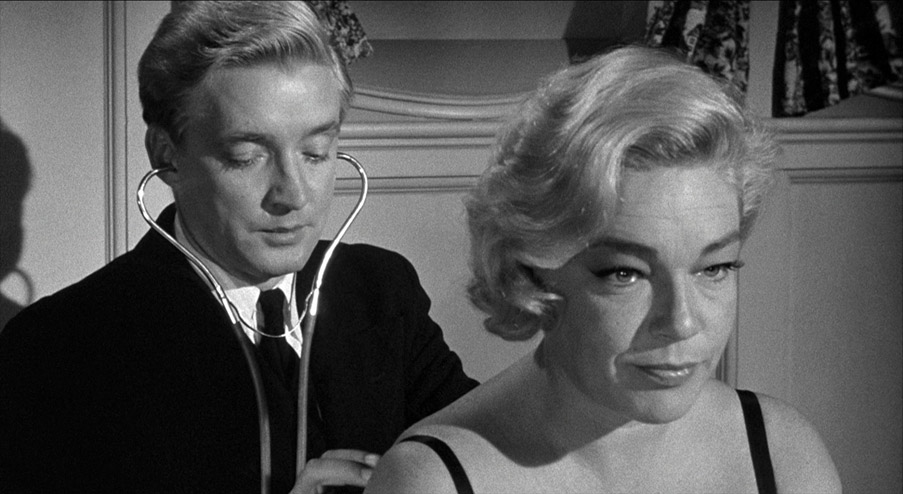
Simone Signoret as arrested political activist La Condesa is taken aboard as a prisoner at Cuba where the boat also picks up hundreds of recently unemployed manual workers. The class divide asserts itself as the unkempt workers are housed on deck or in steerage where hygiene is delivered by a high-powered hose. There will be a stop over at Tenerife to drop off the Condesa where she will end up in a German prison and disgorge the ship of its hundreds of migrant workers. The ship's doctor, Willi, played by Oskar Werner, has a heart condition (foreshadowing alert) and is attracted to the rather fatalist Condesa and on night one it's made clear that she is a drug addict. This strengthens the doctor's will to rid her system of narcotics. Affection and mutual curiosity take their course. Representing the youth at the time are; what seem to be a family unit and a pair of young lovers. Ruled over by a quick-tempered José Greco as Pepe (a father figure forever smacking his children) is a troupe of dancers. Pepe also seems to be a pimp! Greco was enormously influential as a renowned flamenco dancer who was fêted by America in the 50s and 60s and how Kramer convinced him to play such an unsavoury part is beyond me but that man can dance. Barbara Luna as Amparo is one of his women who flirts her way around men of means and whose warm tap shuts off in an instant she realises her marks have no means. But she has her moment to shine. Luna's also extremely well known for a few years later guest starring in a fan favourite of Star Trek TOS ('The Original Series' in case Trek doesn't run in your veins), Mirror, Mirror. She plays Lt. Marlena Moreau or otherwise known as 'The Captain's Woman!' Ah, Star Trek did kind of have its cake and eat, didn't it?
The young lovers are George Segal as David and Elizabeth Ashley as Jenny. The former is an artist who is a crusading socialist who desperately wants his art to change hearts and minds. The latter is a strong, passionate woman whose artistic skills (irony but subtle enough) far outstrip her lover's. We're only given one shot of her work but it's startling as opposed to Segal's well meaning but dreary portraits. He reminded me of Michael Palin as Dennis in Holy Grail but better dressed... "Come and see the violence inherent in the system!" Segal wants a girl to look after his every need and as this was the sixties, women wanted a little more than to be domesticated sex slaves. Too far? Some would say not nearly far enough. It's interesting to see how an actor (Segal, still working) got typecast. He started playing in comedies and was never given a role that would stretch his dramatic range. In her final role on board the ship of fools, was Vivien Leigh. It's said that she had bi-polar disorder before anyone knew what that really was and her illness had scuppered her personal relationships and a few professional ones. Even the nicest man in 50s Hollywood, David Niven, pronounced her "...quite, quite mad." Here she was, to the cast and crew, clearly not 'well' but as part of her performance, her condition integrated well if that's not too crass a thing to say about an actress. She plays Mary Treadwell, a woman who is living through her abject failure to say twenty-four years of age. It's a touching and subsequently lauded performance. There are two standout moments that drop your jaw. Drunk, she staggers about the ship trying to get back to her cabin. Lost in cloudy thought, she suddenly snaps and performs exactly ten seconds of a perfect Charleston. She then switches off and you think, what extraordinary control. It's that control that is utterly lost in her second standout moment. A leering sex pest, Lee Marvin, has been directed to the wrong cabin by a prostitute who wants a little revenge. He turns up and crashes through Leigh's door and while as a viewer there's a little hope that her self esteem will be boosted by the attraction of another man (and that Marvin will finally succeed in what he's failed at all voyage), but instead all hell breaks loose. He makes the mistake of backing out, rejecting her and she goes postal with the heel of a slipper that makes contact a few times with Marvin's face. That shock in his eyes has a reality to it even the best actors find hard to fake. She's a wild cat and many have suggested this wasn't acting... A final word on Vivien Leigh; in the commentary, there's talk of what may be an urban myth but if it's true, it's heartbreaking. After a party at Leigh's house, she would often play the guests out with Max Steiner's theme from her biggest hit Gone with the Wind. If that's true, it points at insecurity levels that approach Trump's own. Still, let's put one thing into perspective, a fact that could turn a lady's head. Gone with the Wind's world beating theatrical gross (let's forget VHS/DVD/Blu-ray sales), adjusted for inflation is still $220 million dollars more than the film behind it in second place. According to Box Office Mojo, Wind's gross was $1,854,769,700 while Star Wars lags behind with $1,635,137,900. Just so you can calculate that in perspective, the reigning box office champ is Avatar. Adjusted for inflation, this is in fifteenth place. Gone with the Wind will take some beating. Perhaps Leigh had a right to that crutch.
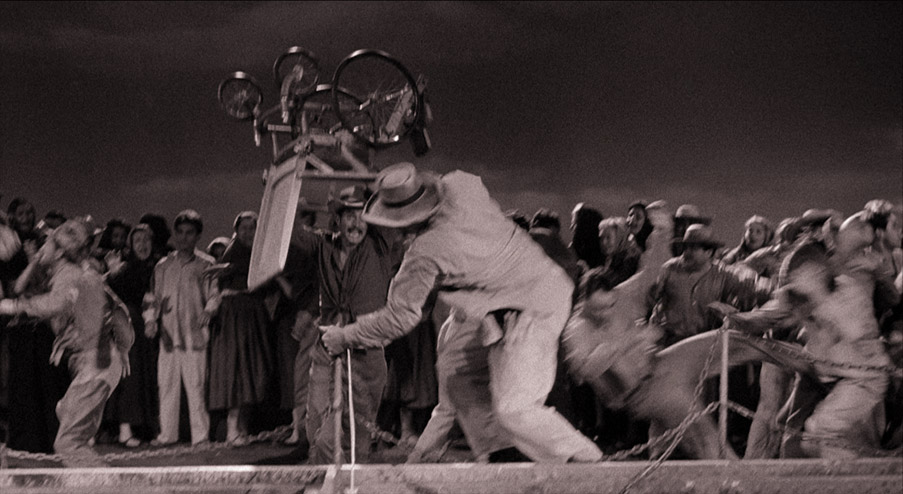
Kramer's rock solid direction never calls attention to itself despite the fact that some back projection horizons suggest the ship may be travelling downhill at forty-five degrees but these are technical nit-picks. The editing by Robert C. Jones is razor sharp and assured. Each scene (and we are talking about mostly talking scenes) have their own internal drama to play out but there are some bigger set pieces that pepper the concern over where society will be taking these characters. Kramer's film is full of many other interesting characters aside from those mentioned and well worth taking the whole in and getting that overwhelming sense of doom as we begin to unpick the futures that each can expect in Germany in the mid thirties to the mid forties.
The 1.85:1 black and white presentation with satisfyingly correct thin black matte lines top and bottom of frame looks terrific. It's clearly sourced on film with the grain almost proud but it never detracts. The contrast levels are not quite as polarised as other titles in Indicator's back catalogue but that suits the film's emotional range. This is a soft, probing character narrative heading for the hardest of brick walls. Albert Whitlock's matte paintings are as excellently rendered as ever and of course in black and white, matte lines are even more difficult to spot – not that I was trying too hard. Overall, it's a great job on a much-undervalued film.
The PCM linear mono sound perfectly renders the dialogue sharply intelligible (which puts a few modern dramas to shame) and Ernest Gold's score is vibrant and there is no noticeable hiss which for a 1965 movie, is rather surprising – I suspect 21st century improvement, something I have no problem with at all.
There are new and improved English subtitles for the deaf and hard-of-hearing.
Audio commentary with Nick Redman, Lem Dobbs and Julie Kirgo
To review a commentary is by definition to spoil, one sentence after the other. To this end I will say that the dream team of Indicator's chosen few does another terrific job throwing up interesting titbits every thirty seconds. But there are a few choice moments that I have to mention purely as a tease for the commentary itself. Skip to the next extra feature review if you want to go in cold...
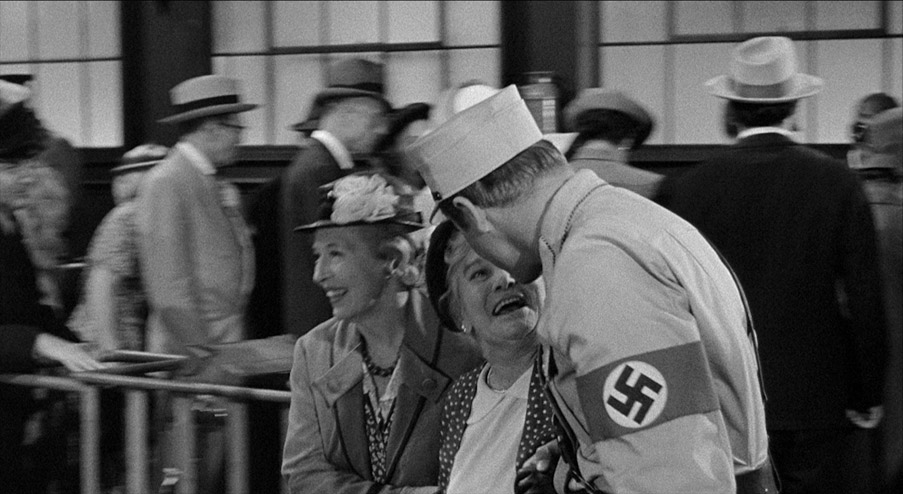
Stanley Kramer's reputation has always fallen foul of those who state with some dull regularity "If you want to send a message, use Western Union..." but our intrepid three remind us that cinema isn't and never should be only entertainment and eye candy though there is a place for those too. Screenwriter Abby Mann's quote never gets old, the fact that as a writer he is obliged to "...comment on the world in which he lives." It's curious how cinema seems to be quiet about Brexit and Trump. Maybe we're all too stunned to comment? Julie Kirgo's support of the appeal of Oskar Werner is delivered a bomb blast from a critical quote from François Truffaut courtesy of Lem Dobbs and the worst thing about it is that even when Werner is having a bad time, he does that smiling thing that Truffaut complained about. Fascinating to find out that Simone Signoret was actually German born. She played one of the most evil murderers in Les Diaboliques, a movie in which its titular character never appeared – not a great joke but I'm smiling. Lem's insight that cinema should be the never ending battle between freedom and obligation... Nice one. The trio also voice the theory that every single character in the film is in fact, facets of the same one character. The editing certainly gives rise to this theory. Watch the film with that in mind and you'll spot many indications of it. It's very clever but then Kramer was a smart man with his heart and soul in the right place. There's a mention on one of the few 180 degrees reversed sets (a bedroom containing the Nazi and the Jew). Can it be a coincidence that this is related to the Nazi's chosen sport of table tennis, a two way sport if ever there was one? Prétentieux, eux? I'll have none of it. This is an animated and spirited discussion - not without its disagreements - but one between three people all professionally respected and enthusiastic beyond fault. Highly recommended.
Karen Kramer Introduction (2007, 1' 50")
Ever loyal to her husband, his widow Karen's 2007 introduction to Ship of Fools is as earnest as her others. She ends the intro with an almost defiant "It still remains one of Stanley's acclaimed films," which feels a little like one way of describing the runt of the litter but at the time the film was well reviewed and well attended. Perhaps Kramer's more brightly shining lights have dimmed this one somewhat which is a shame because it's a fascinating film from a mainstream that would not normally countenance such an effort.
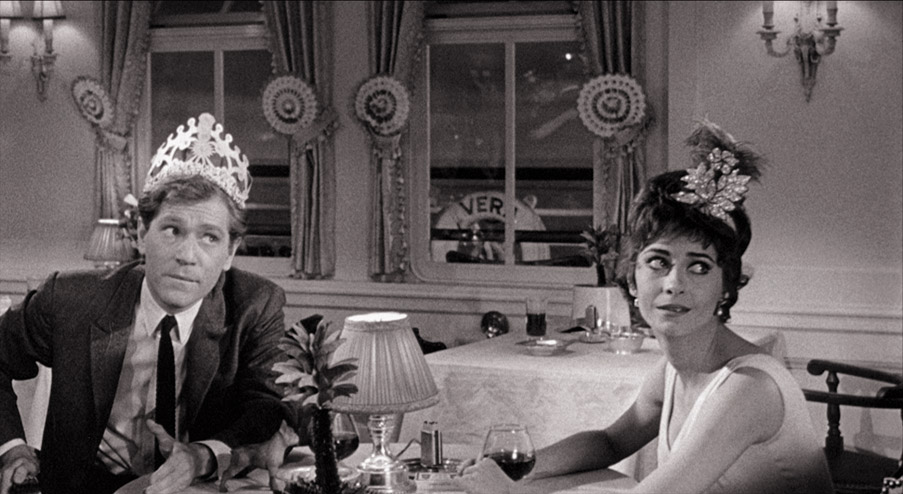
On Board the 'Ship of Fools' (2007, 28' 01")
No surprise that the principal players in this 11-year-old doc are the three youngest passengers, Elizabeth Ashley, her onscreen beau George Segal and dancer/actress Barbara Luna. Karen Kramer pops in from that same 2007 mega-interview, extracts of which are distributed over quite a number of DVDs and Blu-rays of her husband's pictures. Alec Baldwin (ex-Clancy action hero, 30 Rock exec and Trump impressionist) breaks down what Kramer gets out of actors and Robert Jones the editor also adds his bit to the appreciation. There is a smattering of clips from the film throughout (and if you've just seen the film twice you tend to fast forward through them, no disrespect). "Nobody was the star..." says George Segal and the set was "...ego free." Many of his co-stars who worked with the more troublesome stars would disagree. But on balance this is a solid accompaniment to the film.
Voyage on a Soundstage (2007, 10' 52")
This is a celebration of black and white cinematography. Marshall Schlom was the script supervisor and shares his memories. Famed cinematographer Laszlo Kovacs looks back on his semi-namesake, Ernest Laszlo (Ship of Fools' director of photography) and if you love black and white cinematography, then this extra is a primer...
Original theatrical trailer (3' 38")
Unusual in its day, but here is a director subtly criticising Hollywood marketing while trying to promote his film within the same system. As such it's a fascinating example of a trailer like no other. Kramer was well aware of how against the grain his movie was so elected to play the 'famous director' card. He comes across very well but the specialist introduction can backfire. But what a cast, one that Kramer slowly takes us through expressing all the hyperbole about the actors that he has eschewed about the film itself. But it's quite effective.
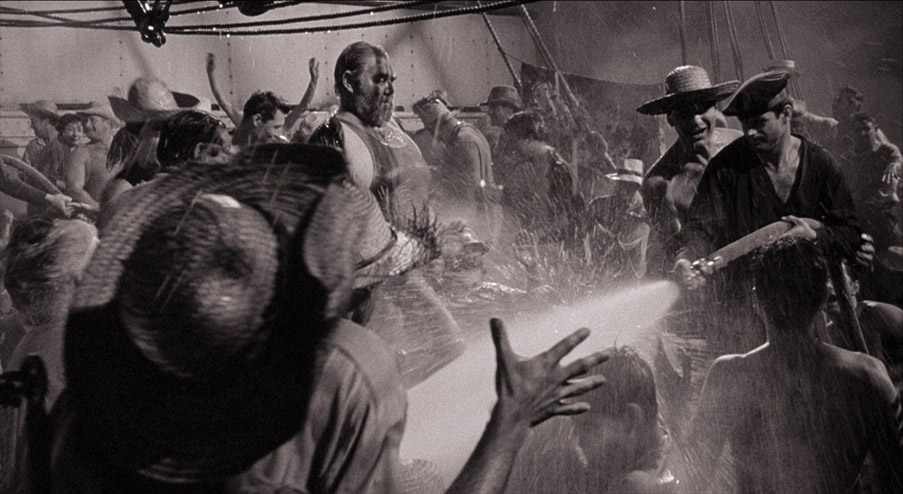
Image gallery: on-set and promotional photography
There are 78 shots, with about half with two pictures on the one screen. There are only 2 in colour and 2 poster designs.
Limited edition exclusive booklet with a new essay by Neil Sinyard, an overview of contemporary critical responses, and historic articles on the film
1. The Troubled Heart; Some Reflections on Stanley Kramer's Ship of Fools by Neil Sinyard
This 10 page (including stills) essay by long time Blu-ray go-to for Hollywood backstories, Professor of Film Studies, Neil Sinyard is a beaut. The piece is in the form of an introduction to Kramer, a few pages on the film and a conclusion. It's a compelling read pushing to the fore the many aspects of the film that can be easily overlooked. Well worth a read and a think about. I loved his end piece summing up all the issues that the film dealt with and saying "Have they gone away?" "Hardly," is the correct conclusion so there is relevance to this film outside the appreciation of craft and superlative acting.
2. Stanley Kramer on Lee Marvin and Ship of Fools, an Interview by Dwayne Epstein
This one's 8 pages including stills and is a fascinating after-the-event glimpse into Kramer's creative process with actors. They spend a lot of time underlining variants of Lee Marvin's tough guy persona covering a sensitive and caring inner core. I like Kramer's idea of making pacts with actors – what a great idea – and then it came to me that on a shoot many years ago I made a pact with a non-actor that enabled him to relax and lighten up while on camera. It was probably a little less sophisticated a pact that Kramer may have made with Oskar Werner and Simone Signoret. It was simply this. I said, "Regardless of what happens on the shoot, in the edited version you will never look like a dickhead." That seemed to work.
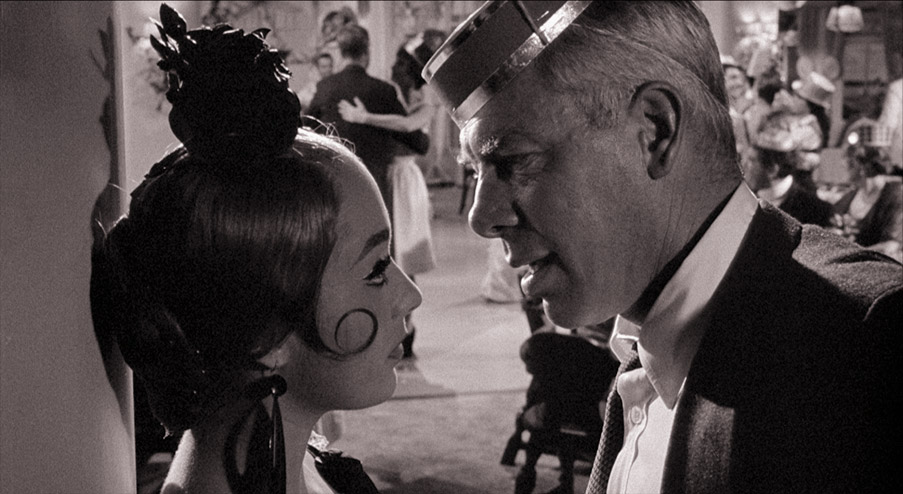
3. Working with Lee Marvin – interviews with Dwayne Epstein
This piece is 12 pages of recollections about Marvin from his co-stars on the film including a personally painful memory from his ex-wife. Barbara Luna opens up on Marvin's alcohol consumption and how the fight scene with Leigh was for real. Oskar Werner comes in for a bit of a roasting and we learn that everyone tip-toed around Vivien Leigh. Luna's recollections are all very believable. A film set can be an insane place. There're a few pages on Marvin's marital strife and then a coda where both Kramer and actress Christiane Schmidtmer vehemently deny that Leigh injured Marvin in any way... Ah, the truth, so hard to pin down.
4. Archive Review – Tom Milne on Ship of Fools from the Monthly Film Bulletin
Always fascinating to see how a film was actually received at the time of its release. He praises some of the performances, has a go at Kramer for his heavy-handedness and calls the film watchable. Phew.
An expertly choreographed ship-bound drama with a great array of characters, Ship of Fools doesn't tell a story as much as it warns against bigger more foreboding stories. Through the perspective of a diverse roster of characters, we take a journey, learning along the way that the destination could never have been imagined. Well recommended despite known as one of Stanley Kramer's less celebrated efforts, Ship of Fools is nonetheless compelling cinema.
|